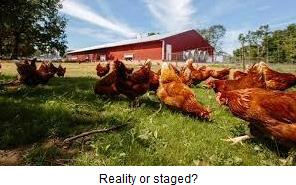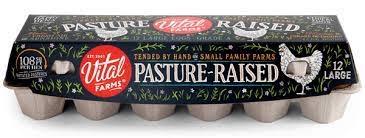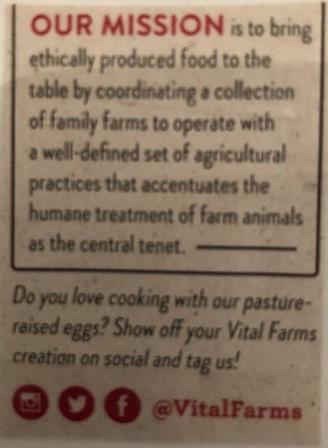 The PETA inspired lawsuit Usler v. Vital Farms Inc. represents a new challenge to egg producers promoting either welfare or environmental attributes on labels. Ever eager to misuse the legal system to advance a vegan agenda, PETA with its vast resources and funding contrived a class to sue Vital Farms, a certified B corporation trading as VITL. Vital Farms reported revenue of $77 million for the first quarter of fiscal 2022. The company receives eggs from as many as 250 contractors and distributes product nationally.
The PETA inspired lawsuit Usler v. Vital Farms Inc. represents a new challenge to egg producers promoting either welfare or environmental attributes on labels. Ever eager to misuse the legal system to advance a vegan agenda, PETA with its vast resources and funding contrived a class to sue Vital Farms, a certified B corporation trading as VITL. Vital Farms reported revenue of $77 million for the first quarter of fiscal 2022. The company receives eggs from as many as 250 contractors and distributes product nationally.
According to carton labels and information posted on their website, Vital Farms claims “pasture-raised” management according to “ethical” principles. Production conforms to the standards established by Humane Farm Animal Care (HAFC) and farms are audited by Oregon Tilth.
 The class-action lawsuit against Vital Farms and three officers is based on label statements specifying “pasture-raised” and “humane treatment”. PETA disputes the claims that they consider to be misleading and representing deceptive advertising in contravention of Section 5 of the FTC Act.
The class-action lawsuit against Vital Farms and three officers is based on label statements specifying “pasture-raised” and “humane treatment”. PETA disputes the claims that they consider to be misleading and representing deceptive advertising in contravention of Section 5 of the FTC Act.
Following pre-trial motions, the Court dismissed claims against officers based on the Plaintiff failing to demonstrate individual responsibility. This aspect will be revisited in subsequent filings. Vital Farms was however unsuccessful in attempting to have the case dismissed. The Court rejected the defense that the HFAC seal denoting welfare certification justified the commercial claims. Applying tortured logic PETA submitted that the HFAC standards as defined were not necessarily understood by consumers, notwithstanding a website reference documenting these standards. The Court also rejected the claims of “ethical production” since these were subjective and aspirational in concept and could be misinterpreted by consumers.
 In a review of Greenwashing litigation Attorney Nathan Huff of law firm K&L Gates, LLP considered five areas of concern arising from the PETA attack on Vital Farms. These included:
In a review of Greenwashing litigation Attorney Nathan Huff of law firm K&L Gates, LLP considered five areas of concern arising from the PETA attack on Vital Farms. These included:
- Label statements and claims may invite Greenwashing lawsuits
- Since it is difficult to substantiate label claims including “sustainable”, “all natural” and “humane” producers using undefined terms are vulnerable to litigation
- Reliance on an accepted welfare or environmental certification maybe inadequate to defend a label claim
- Individual officers are vulnerable to litigation and may become defendants in Greenwashing lawsuits.
It is anticipated that PETA and kindred organizations will be emboldened by either a settlement or an outright win and will then scrutinize label claims across a broad section of livestock production with respect to either welfare or sustainability.
 Attorney Huff recommends careful analysis of all label text and images on cartons with the need to substantiate statements with supporting evidence. Producers should adhere to the principles defined in the Federal Trade Commission Green Guides. The question of third-party certification for humane management or sustainability should be carefully scrutinized especially if there is any concern regarding the credentials of the certifying agency or the auditors.
Attorney Huff recommends careful analysis of all label text and images on cartons with the need to substantiate statements with supporting evidence. Producers should adhere to the principles defined in the Federal Trade Commission Green Guides. The question of third-party certification for humane management or sustainability should be carefully scrutinized especially if there is any concern regarding the credentials of the certifying agency or the auditors.
It stands to reason that producers who make extreme claims for either sustainability or welfare will be most vulnerable to litigation. Attempting to “out-welfare” competitors in promotional campaigns, labels, text or images on cartons or on websites will be an invitation to animal welfare activists.